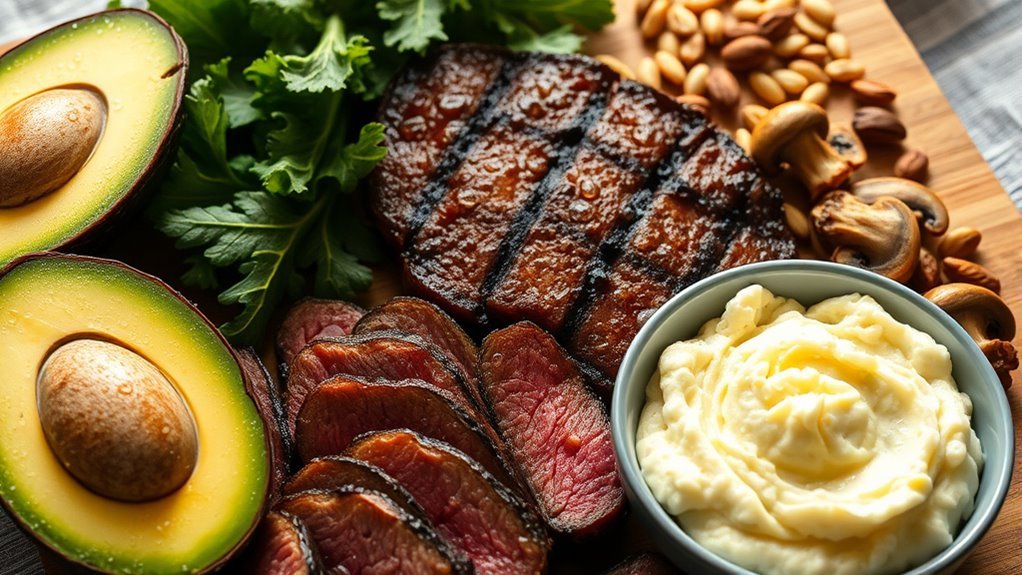The keto diet works by reducing your carbohydrate intake considerably, which forces your body into a state of ketosis. In ketosis, your liver converts fat into ketones, an alternative energy source that can enhance fat burning and improve mental clarity. This change also stabilizes blood sugar levels and controls appetite. However, changing can come with side effects like the “keto flu.” Understanding more about food choices and managing these effects can help you succeed on this journey.
Understanding Ketosis: The Metabolic Shift

When you reduce carbohydrate intake considerably, your body undergoes a remarkable metabolic shift known as ketosis. In this state, your liver converts fat into ketones, which serve as an alternative energy source. This metabolic adaptation can lead to various ketosis benefits, such as increased fat burning and improved mental clarity. Many people also experience reduced appetite, making it easier to manage their weight. Additionally, ketosis may help stabilize blood sugar levels, which is particularly appealing for those looking for dietary freedom. However, it’s essential to note that moving into ketosis can be challenging for some, often accompanied by temporary side effects known as the “keto flu.” Understanding these dynamics can empower you to make informed choices on your keto journey.
The Role of Carbohydrates in the Body

Carbohydrates play an essential role as a primary energy source for your body, fueling everything from daily activities to intense workouts. They’re stored as glycogen in your muscles and liver, providing readily accessible energy when needed. Understanding how carbohydrates function can help you make informed choices, especially when considering dietary changes like the keto diet.
Energy Source Overview
The role of carbohydrates in the body is essential, serving as one of the primary energy sources for daily activities. When you consume carbs, your body breaks them down into glucose, which fuels your energy metabolism. This process is vital, especially during high-intensity workouts, where quick energy is needed. However, when carbs are limited, like in a keto diet, your body shifts to fat oxidation, utilizing stored fats for energy instead. This adaptation can lead to increased fat burning and weight loss. Understanding this change is key for anyone looking to optimize their energy levels while enjoying the freedom of dietary choices. Ultimately, balancing carbohydrates and fats can help you achieve your personal health goals effectively.
Glycogen Storage Importance
Although you might not think about it often, glycogen storage plays an important role in your body’s energy management. Glycogen, stored primarily in your liver and muscles, acts as a quick energy source. When you engage in intense exercise or experience glycogen depletion, your body taps into these reserves. Proper glycogen replenishment after workouts is vital for recovery and maintaining performance. It guarantees you’re ready for your next challenge.
| Glycogen Function | Importance | Consequence of Imbalance |
|---|---|---|
| Energy Supply | Fuels physical activity | Fatigue and reduced performance |
| Metabolic Regulation | Supports glucose balance | Blood sugar instability |
| Muscle Recovery | Aids in muscle repair | Prolonged soreness |
| Brain Function | Enhances cognitive abilities | Mental fatigue |
| Hormonal Balance | Influences hormone levels | Mood swings |
How Fats Become Fuel: The Science of Ketones

When your body enters a state of ketosis, it starts transforming fats into an essential energy source known as ketones. This process, known as fat metabolism, enhances energy efficiency by promoting fat oxidation. As you adapt to this fat-centric energy source, your body undergoes fat adaptation, allowing for improved metabolic flexibility. During this energy change, ketone production becomes crucial; these molecules serve as a cleaner fuel compared to glucose, providing numerous ketone benefits such as reduced inflammation and stabilized energy levels. By maximizing fuel utilization, your body can tap into its fat reserves, releasing ketosis benefits that support both physical and mental performance. Embracing this shift empowers you to harness your body’s natural ability to thrive on fat.
The Importance of Protein in a Keto Diet
In a keto diet, protein plays an important role in maintaining muscle mass while your body shifts into ketosis. Choosing high-quality protein sources is vital to guarantee you’re getting the right nutrients without compromising your carb limits. Balancing your protein intake is key, as too much can hinder ketosis, while too little may affect your overall health and energy levels.
Protein’s Role in Ketosis
While many people focus on reducing carbohydrates and increasing fats in a keto diet, protein plays an essential role in achieving and maintaining ketosis. Understanding protein’s role is important for your success. Here are some key points about protein metabolism on a keto diet:
- Supports Muscle Preservation: Adequate protein helps maintain muscle mass while losing fat.
- Encourages Satiety: Protein-rich meals can keep you fuller for longer, reducing cravings.
- Aids in Recovery: Consuming enough protein helps your body recover from workouts effectively.
- Regulates Blood Sugar: Protein can stabilize blood sugar levels, which is significant for ketosis.
Incorporating quality protein sources guarantees you reap these benefits while enjoying the freedom that comes with a keto lifestyle.
Choosing Quality Protein Sources
Selecting quality protein sources is essential for anyone following a keto diet, as they not only support your body’s needs but also enhance your overall health. Incorporating lean meats, such as chicken and fish, provides essential amino acids that aid muscle repair and growth. Don’t overlook plant proteins like legumes and nuts; they offer sustainable sources of protein that can diversify your diet. Pay attention to protein quality and timing to maximize benefits, especially post-workout. If you struggle to meet your protein needs, consider protein supplements, but make certain they’re from trusted sources. Emphasizing protein diversity not only fulfills nutritional requirements but also keeps your meals exciting, allowing you to enjoy a fulfilling keto journey while supporting your health.
Balancing Protein Intake
To effectively follow a keto diet, balancing your protein intake is essential for maintaining energy levels and supporting muscle health. It’s not just about how much protein you consume, but also when and what quality it is. Here are some key points to reflect on:
- Protein Quality: Choose high-quality sources like grass-fed meats, wild-caught fish, and organic eggs.
- Protein Timing: Distribute your protein intake throughout the day to optimize muscle recovery and energy levels.
- Moderation: Aim for moderate protein consumption; too much can kick you out of ketosis.
- Pair with Fats: Combine protein with healthy fats to enhance satiety and maintain ketosis.
Potential Health Benefits of the Keto Diet
As you explore the potential health benefits of the keto diet, you’ll find that it offers more than just weight loss. Many people report improved focus and mental clarity, which can enhance productivity. The diet may also help stabilize blood sugar levels, making it beneficial for those with insulin resistance. Additionally, some studies suggest it can positively affect heart health by improving cholesterol levels and promoting inflammation reduction. You’ll likely experience better appetite control, which can aid in maintaining a healthy weight. For athletes, keto may enhance performance by providing a steady energy source. Ultimately, there’s emerging evidence suggesting potential longevity effects, making the keto diet an appealing option for those seeking a healthier lifestyle.
Common Misconceptions About Keto
What do you really know about the keto diet? Many people fall for common keto myths that can skew their understanding. Let’s clear up some diet misconceptions:
- Keto is only for weight loss: It can also help manage certain medical conditions.
- You can eat unlimited fats: Quality and quantity matter; balance is key.
- Keto causes nutritional deficiencies: With careful planning, you can meet your nutrient needs.
- It’s a quick fix: Lasting change takes time and commitment, just like any diet.
Food Choices: What to Eat and Avoid
When starting on the keto diet, understanding food choices is essential for success. Focus on high-fat, low-carb foods like avocados, nuts, and fatty fish. For meal prep, plan your week with keto-friendly recipes to simplify grocery shopping. While dining out, look for dishes that allow ingredient swaps, prioritizing proteins and healthy fats. Keep an eye on food labels to avoid hidden sugars and excess carbs. Snack options like cheese, olives, and hard-boiled eggs can help maintain your energy levels. Practice portion control and meal timing to optimize your results. Don’t forget hydration tips—water is vital. By making informed choices, you’ll enjoy the freedom of delicious meals while staying committed to your keto journey.
Possible Side Effects and How to Manage Them
While many people find success on the keto diet, it’s important to be aware of potential side effects that can arise as your body adapts to a low-carb lifestyle. Common issues include:
Be mindful of potential side effects as your body adjusts to the keto diet for a smoother transition.
- Keto Flu: You might experience fatigue, headaches, and irritability. Stay hydrated and consider electrolyte supplementation.
- Electrolyte Imbalance: Low-carb diets can lead to deficiencies. Monitor your intake of potassium, magnesium, and sodium.
- Digestive Issues: Some people face constipation or diarrhea. Incorporate fiber-rich, low-carb vegetables.
- Keto Rash: A rare skin reaction may occur. Guarantee proper hydration and consult a healthcare professional if it persists.
Being aware of these side effects and managing them effectively can enhance your keto experience while keeping your blood sugar stable and energy levels high.
Tips for Successfully Transitioning to a Keto Lifestyle
Shifting to a keto lifestyle can feel intimidating, especially with the significant dietary changes involved. To ease this adjustment, start with meal prep. Planning and preparing your meals in advance can prevent impulsive eating and help you stick to keto-friendly options. Focus on low-carb vegetables, healthy fats, and quality proteins.
Next, embrace a mindset shift. Understand that change is a process, and setbacks might happen. Instead of viewing this as a restrictive diet, see it as a newfound freedom to explore diverse foods. Educate yourself about keto-friendly ingredients and recipes that excite you. Surround yourself with supportive communities, whether online or offline, to share tips and experiences. With patience and practice, you’ll find success in your keto journey.
Frequently Asked Questions About the Keto Diet
1. What is the Keto Diet?
The Keto Diet, short for ketogenic diet, is a low-carbohydrate, high-fat diet that aims to shift the body’s metabolism away from carbohydrates and towards fat and ketones. By drastically reducing carbohydrate intake and replacing it with fat, the body enters a metabolic state known as ketosis, where fat becomes the primary fuel source instead of glucose derived from carbs.
2. How does the body enter ketosis?
The body enters ketosis when it has limited access to carbohydrates, which are the primary source of glucose. When carb intake is reduced to about 20-50 grams per day, the body depletes its glycogen stores and begins to break down fats into ketones in the liver. These ketones then serve as an alternative energy source, leading to various metabolic changes that promote fat burning.
3. What are the main benefits of the Keto Diet?
The Keto Diet offers several potential benefits, including weight loss, improved blood sugar control, enhanced mental clarity and focus, increased energy levels, and reduced hunger. Some studies suggest it may also help with certain neurological disorders, such as epilepsy, and improve markers of heart health. However, individual results can vary, and it’s essential to approach the diet carefully.
4. Are there any side effects of the Keto Diet?
While many people experience positive effects on the Keto Diet, some may encounter side effects, especially during the initial transition into ketosis. Commonly referred to as the “keto flu,” these symptoms can include fatigue, headaches, dizziness, irritability, and digestive issues. These effects are typically temporary and can be mitigated by staying hydrated, ensuring adequate salt intake, and gradually reducing carbs over time.
5. Is the Keto Diet suitable for everyone?
The Keto Diet may not be suitable for everyone. Individuals with certain medical conditions, such as pancreatitis, liver disease, or disorders of fat metabolism, should avoid it. Additionally, pregnant or breastfeeding women and those with a history of eating disorders should consult with a healthcare professional before starting the diet. As with any dietary change, it’s crucial to consider personal health circumstances and seek guidance from a qualified nutritionist or doctor.
References
- https://www.who.int/news-room/fact-sheets/detail/healthy-diet
- https://www.ncbi.nlm.nih.gov/pmc/articles/PMC6340387/
- https://www.healthline.com/nutrition/what-is-the-keto-diet
- https://www.mayoclinic.org/healthy-lifestyle/nutrition-and-healthy-eating/in-depth/keto-diet/art-20459705
- https://www.cdc.gov/healthyweight/healthy_eating/dietary_guidelines.html
- https://www.nutrition.gov/subject/healthy-eating
- https://www.jamanetwork.com/journals/jama/fullarticle/2761927
- https://www.sbm.org/news/keto-diet-research
- https://www.hsph.harvard.edu/nutritionsource/keto-diet/


